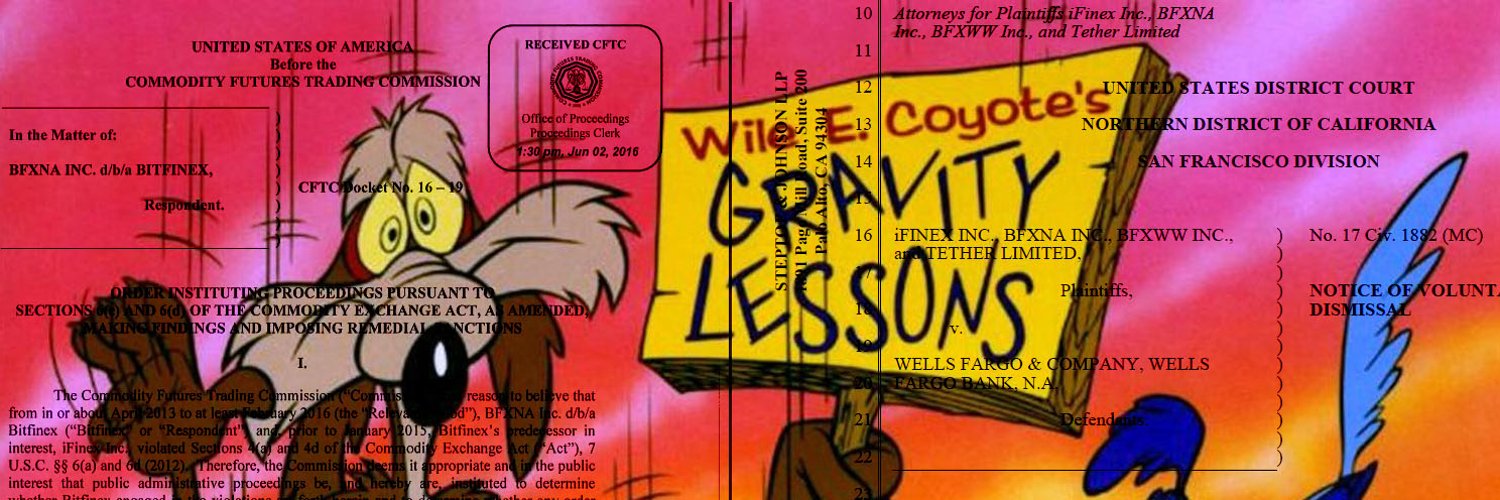- Sign up to get every new blog post by email — and get your friends and colleagues to sign up as well!
- We can’t go down the pub yet — but $5 on my Patreon is like buying me a drink once a month. Support the continued supply of pub anecdotes!
Craigness
Reddit /r/bitcoin has gone through the lists of early mined bitcoins that Craig Wright submitted in discovery in Kleiman v. Wright, claiming they were what he mined as Satoshi Nakamoto, the founder of Bitcoin. “There are at least three lists that are supposed to represent Wright’s mined bitcoin. All three lists have recently spent blocks in them, when Wright testified that the keys are inaccessible.” [Reddit]
Just to absolutely bludgeon this point home — some early Bitcoin miner just signed a message from 145 addresses that Dr Wright claimed were his, saying:
Craig Steven Wright is a liar and a fraud. He doesn’t have the keys used to sign this message.
The signatures are valid. [paste.debian.net; Reddit]
According to BitMEX Research, 143 of these 145 blocks are outside the “Patoshi” pattern of blocks — the early blocks of mined bitcoins that are thought to be part of the Satoshi stash — and the other two are weakly maybe-members, but probably not. So this probably isn’t Satoshi cryptographically returning to earth. [Twitter]
The estate of Dave Kleiman, in its case against Craig Wright, had already entered an extensive motion for case-terminating sanctions on Wright, based on his bad behaviour in the case so far. [Omnibus Sanctions Motion, PDF; The Block] These signatures have been added as further evidence for sanctions on Wright — they’re cryptographic proof that Wright doesn’t control the coins he claimed to under oath, even via keys in trust. [Notice of Supplemental Evidence, PDF]
Dr. Wright also appealed his loss in his defamation case last year against Roger Ver, and just lost the appeal too: “England and Wales is not clearly the most appropriate jurisdiction.” [BAILII, PDF; Decrypt]
I’m shocked and appalled that Google tells me I’m the first person to assemble the phrase “Bitcoin Dorian’s Vision”.
Where in the world is Bitfinex?
“It’s September of 2018 and my third trip to China — this time, for a very particular reason: Bitfinex.” Cas Piancey visits iFinex’s claimed office locations. [Medium] Bitfinex responded to questions about their nonexistent offices with a press release. [Decrypt]
There were $212 billion of Tether transactions in 2019. There were $78.9 billion in just the first quarter of 2020. [The Block]
Tether is mostly issued on Ethereum now. A new report from Flipside Crypto notes that no Ethereum tether has ever been burnt — every single one is still in circulation. Ethereum tethers are mostly used by arbitrageurs on exchanges:
most of Tether is used on centralized exchanges, namely Huobi, Binance and Bitfinex. The constant movement back and forth between users and these exchanges reflects the fact that Tether is mostly used for arbitrage. Users can easily make a profit by buying from one exchange and selling on another for a higher price.
The arbitrageurs don’t send the tethers directly between exchanges, either — they withdraw them to their own wallets, then put them onto the other exchange. [CoinTelegraph]
There’s also an excellent animation of the movements of tethers on Flipside Crypto’s own site. The bagholders turn out to be the small-time users. [Flipside Crypto]
Klyith from SomethingAwful explains Tether: [SomethingAwful, intermittently paywalled]
A bunch of pixies show up and start flooding the parchment market with fairy gold, driving prices to amazing new heights. But when any of the player characters try to spend the fairy gold in other towns or to pay tithes to the king, it turns into worthless rocks.
If you denounce the pixies to the peasants or start using dispel magic to reveal that fairy gold is rocks, the price of parchments will collapse and the peasants may stop using them altogether. But if you ignore the pixies and keep the parchment economy going, you will end up with more and more worthless rocks instead of gold. The pixies can of course tell the difference between fairy gold and real gold at a glance. So they will quickly drain all the real gold from the whole township if you don’t act. What do you do?
Calibra — not dead, just rebranding
From Facebook’s Annual Shareholders Meeting, 27 May 2020: [PDF]
Investor: “I am very supportive of Libra, but I’d like to know how does this benefit Facebook financially? How is Libra going to make money for Facebook?”
Zuckerberg: “… somebody who clicks on that ad is now going to be more likely to buy something because they actually have a form of payment that works that’s on file, then it basically becomes worth it more for the businesses to bid higher in the ads …”
Now, you might think that literally the same thing — having the money right there to buy things — would work just as well with Facebook Pay, or its predecessor, Messenger Pay …
The Libra brand appears not so hot right now — Facebook’s Calibra wallet has rebranded as Novi. “It became clear that there was more confusion than we wanted,” says David Marcus. [Twitter]
Finance Magnates asked me about the name change from Calibra to Novi. I pointed out it’s all still vapourware — “the most important thing about Libra is that it still doesn’t exist.” [Finance Magnates]
Multiple Single-Currency Coins were always Mark’s Vision. https://t.co/ydfp7iGubB
— Libra (@LibraReserve) April 16, 2020
Squiddy spurns Bitcoin’s affections
Goldman Sachs have tired of being nagged about Bitcoin — and did an investor call about this nonsense, and about what might be good for investors in the Covid-19 era.
So, Goldman Sachs made several obvious and uncontroversially true statements about internet novelty collectibles. Page 29 notes that bitcoins: [Goldman Sachs, PDF]
• Do Not Generate Cash Flow Like Bonds
• Do Not Generate any Earnings Through Exposure to Global Economic Growth
• Do Not Provide Consistent Diversification Benefits Given Their Unstable Correlations
• Do Not Dampen Volatility Given Historical Volatility of 76% — On March 12, 2020, the price of Bitcoin fell 37% in one day
• Do Not Show Evidence of Hedging Inflation
• We believe that a security whose appreciation is primarily dependent on whether someone else is willing to pay a higher price for it is not a suitable investment for our clients.
• We also believe that while hedge funds may find trading cryptocurrencies appealing because of their high volatility, that allure does not constitute a viable investment rationale.
Page 32 details the many ways in which the crypto space is suffused with fraud. Page 33 notes that the infrastructure is “Still Young” — which is a polite way of saying it’s run by slapdash amateurs with no idea what they’re doing.
The bagholder tears over this are exquisite. You’d almost think this wasn’t good news for Bitcoin. [FT Alphaville, free with login] A spokesperson for Goldman Sachs declined to comment on the coiner reaction, saying, “I’m not sure there’s much to add.” [Fortune]
Goldman Sachs may be exploring BTC as a safe-haven asset, with the investment bank hosting a coming call on inflation, Bitcoin, and gold https://t.co/AI500Xxhj1
— Cointelegraph (@Cointelegraph) May 24, 2020
Now wash your hands
The Handshake protocol claims to provide blockchain-based DNS resolution for the World Wide Web — translating a name like “google.com” into an Internet Protocol address like “216.58.211.174”. But it’s on a blockchain — so it’s uncensorable!
Handshake has done $10 million of trades on the Namebase exchange since the token launched! Is this good news for the blockchain, for digital freedom and for fighting censorship? Let’s ask CoinDesk:
Update (May 28, 20:11 UTC): This article has been edited to clarify there were reportedly $10 million worth of HNS trades on Namebase since the token launched, but only a fraction of those users bought domain names.
That is: Handshake is just another minor altcoin for crypto day trading gamblers. But CoinDesk have left the claim that this is a “Race for Censorship-Resistant Websites” in the headline, OK. [CoinDesk, archive]
ICO, ICO
“Inside the $9 Million Crypto Scam Backed By a State Senator and a YouTube Psychic.” META 1 would take your $22.22 in actual dollars and exchange it for a token, which would definitely be worth $50,000 in a few years. After a while, the coin was backed by a vault full of gold — which turned out not to exist. The state senator, Dave Schmidt, was previously most famous for misappropriating $32,000 in campaign funds. The company claimed it operated in a “private jurisdiction” and was “not bound by any laws.” This story has everything. [Daily Beast]
SEC fines the BitClave ICO from November 2017 as an unregistered security — $400,000 fine and $25.5 million disgorgement (giving everyone’s money back), plus $3.4 million pre-judgement interest on the disgorgement. [Press release; administrative order, PDF]
Case minutiae — Telegram appealed against the SEC’s injunction against them being granted — and on Friday 22 May, they dropped that appeal, presumably because they’ve given up on the Telegram Open Network. [PDF]
As well as Free TON, there are two more Telegram Open Network forks — NewTON [ForkLog; GitHub] and TON Chinese Community. [CoinTelegraph; blog post, translation]
Just filled in my first SEC fraud tip. Simple process, took no more than five minutes: https://t.co/urakdBytAF I reported MMM BSC, a multi-million dollar ponzi. It runs on Ethereum and uses Paxos stablecoins for pay-ins/outs. pic.twitter.com/jX8vFXXN9S
— John Paul Koning (@jp_koning) May 29, 2020
Things happen
The Distributed Denial of Secrets project has just leaked the Bahamas company registry. Currently these are just scans of paper documents — they’re looking for helpers to transcribe these to text. The Panama Papers turned up the fact that Tether and Bitfinex had the same owners — what interesting crypto stories might be lurking in this document dump? [Pluralistic; DDOSecrets]
CryptoKitties gives up on the perpetually-clogged Ethereum blockchain, and moves to Dapper Labs’ own new blockchain. Decentralisation works so much better when you run it centrally. Dapper is now trying to repeat the CryptoKitties trick with an NBA tie-in. [Decrypt; TechCrunch]
The number of blockchain investment deals has declined for seven consecutive months — from 121 in July 2019 to 44 in May 2020. [The Block]
A user of Paxful — a peer-to-peer cryptocurrency exchange board — is shocked, shocked to discover that his bank thinks that exchanging questionably sourced money for bitcoins as a business looks like money laundering, and has closed the personal current account he was running the money through. [Reddit]
"The (privatised) Ministry of Truth building was an enormous concrete pyramid with the slogans of the Party etched in enormous letters on each side:
TAXATION IS THEFT
KYC IS OPPRESSION
ACTUALLY IT'S EPHEBOPHILIA"— Ken Keenan (@ken_keenan) May 23, 2020
Love it when bitcoiners make murder and riots about Bitcoin.
— Viktor Bunin @ Amsterdam (@ViktorBunin) May 30, 2020
Your subscriptions keep this site going. Sign up today!


